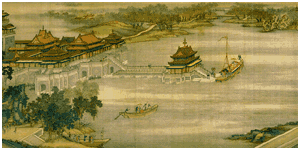An Insight Into Chinese Medicine
Dr. Li, Defu
I
learnt my acupuncture skills from my family which stretches back across several
generations. My patients near and far know me as a diligent and conscientious
doctor. I try my best to deserve that reputation.
My clinic has three treatment
rooms. Most of the time things are relatively quiet. My patients are from various
backgrounds, comprised of various races, ages and dispositions. For the most part,
they come to see me for their back pains, headaches, sore shoulders, pains in
their arms, knees, wrists, and ankles, and stomach troubles. But from time to
time I do treat emergency cases and complicated illnesses that other doctors feel
helpless to treat. You may ask, "Why isn't a patient in an emergency situation
sent to an emergency room, instead of to a Chinese medicine doctor who can only
inspect the tongue and read the pulses? Does this not endanger the patient's life?"
People usually misunderstand that Chinese medicine is capable of only treating
and curing chronic illnesses. Actually, other than emergencies such as amputations
and surgical organ removal because of serious internal bleeding, Chinese medicine
is actually the best choice for many urgent and acute illnesses. This is because,
80% of patients who visit emergency rooms are forced to go there because they
suffer from symptoms that can not be controlled, such as angina pectoris, excessive
bleeding, heatstroke, coma and asthma. The pains or the symptoms of the illnesses
are beyond their tolerance level, and they cannot wait for an appointment that
might be two or three months down the line. The patients feel helpless and have
to seek urgent help from the emergency services. Acupuncture can promptly treat,
control and cure many acute illnesses, and remove patients from danger.
In
fact, using acupuncture treatment to treat acute diseases is not a new invention.
It has a long history in China. Many such cases are documented extensively in
ancient Chinese books. For example, Shi Ji: Bian Que Chronicles described how
Bian Que, a famous Chinese doctor who lived during the Period of Warring States,
used acupuncture to bring back a prince who had been pronounced dead for half
a day. In the book Prescriptions for Emergency Cases written in the Eastern Ji
Dynasty, Ge Hong described how to use acupuncture to treat people from heart failure
and other complicated, acute illnesses such as cholera. In the book Theories on
the Root Causes of Various Diseases written in the Sui Dynasty, Chao Yuanfa wrote
how to use acupuncture to treat stroke and other acute heart problems. In Essential
Emergency Prescriptions, Sun Simiao of the Tang Dynasty wrote extensively on using
acupuncture to treat acute diseases such as stroke, severe vomiting and diarrhoea,
urinary obstruction, uterine bleeding, lung problems, swollen midriff, snake bite,
rabies, lupus erythematosis, epilepsy, and other acute illnesses. He indicated
that these treatments were highly successful in clinical applications.Recently,
I treated a patient whose fever was so high that he had fallen into a coma. When
his family brought him to my clinic, he had become allergic to all kinds of medicines
and his body was covered with rashes that had resulted from allergic reactions.
Doctors of western medicine did not know what more they could do. The patient's
fever just would not go down and he was beginning to exhibit signs of respiratory
failure. I used a needle to scratch his ear lobe and let out five to seven drops
of blood. In less than five minutes, the high fever was gone. The medical effect
was so remarkable that the patient's family members were astonished.
Why is
it that letting go of several drops of blood from the ear by means of an acupuncture
needle can lead to something western medicine and treatment cannot achieve?
It
is because there is a direct relationship between the ear and internal organs.
I will cover this topic in the next instalment of this article.

